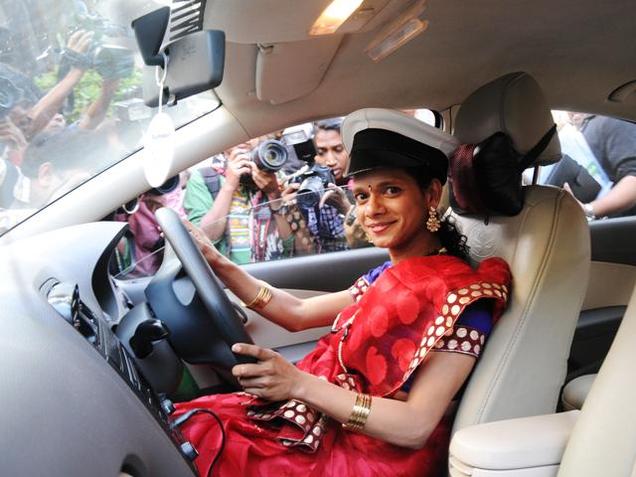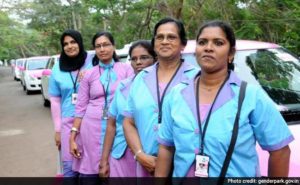
Driven To Empower India’s Queer Community Start-Up LGBT Cab Companies Emerge
by Heather Cassell
You know it could be a great plot for a Bollywood movie: a story about India’s first-ever queer-owned and operated taxi companies, Gender Taxi and Rainbow Wings.
However, it’s a true story. Last month two start-up taxi cab companies were launched. Rainbow Wings, the Mumbai-based cab company dedicated to lesbian, gay, bisexual and transgender drivers, launched January 20. Gender Taxi, is Kerala’s first-ever state sponsored transgender owned- and –operated taxi company, launched on January 31.
Both cab companies aim to help integrate LGBTQ Indians into society by providing them with an avenue for employment through entrepreneurship.
“Driving a taxi is a way for these marginalized people who may not get so many opportunities to gain respectability and independence,” says Arun Kharat, the company’s founder and director of Wings Travels.
“The LGBT community, especially transgenders, have very few economic opportunities because of the huge stigma that they still face,” added Pallav Patankar, director of programs at Humsafar Trust in Mumbai, told the Japan Times. “We hope that this will set the ball rolling and that it will open up other such opportunities for them.”
Arun hopes to provide legitimate employment opportunities to the marginalized community that often faces discrimination at work and in other aspects of their lives.
Rainbow Wings drivers will earn $221 (Rs15,000 €202) a month after completing training, Arun and Pallav say.
Arun anticipates placing about 1,500 LGBT cab drivers in its taxi fleet nationwide, 300 of which will be in Mumbai, he says. As soon as the first five drivers complete training he plans to open up enrollment into the program, he told The Hindu.
“We want them to be eventual entrepreneurs and own these vehicles,” he continues. “We want to ensure that the LGBT community in India enjoys the same rights and livelihood opportunities in India as their counterparts in the West.”
Dr. P.T.M. Sunish, CEO of Gender Park, who calls the G-Taxi an “equality taxi” because everyone will be able to utilize the service, agrees.
“We are hopeful that the project will help them fetch not only a better income, but also a good opportunity to mingle with the mainstream society. People who avail the service of G-Taxi can interact with them which will help change their mindset towards TGs,” he told The News Minute.
P.T.M. and M.K. Muneer, the state minister for Social Justice, didn’t state how many cabs would be on the streets, how much the state was investing in the cabs, or how much they project the drivers will be compensated.
Rainbow Wings in Mumbai, India’s commercial and entertainment center, pilot program is starting out with five cab drivers – three transgender women and two gay men – the founders announced in a January 20 news release.
The five future drivers will hit the streets of Mumbai in 2017 after completing training, customer etiquette training, and the process for obtaining necessary licenses, which is anticipated to take up to nine months to a year to complete.
The cab company is the brain child of Wings Travels and Management and the Humsafar Trust.
Wings Travels is investing $59 (Rs4,000; €53.95) in training per driver for Rainbow Wings, according to the release.
An India-based taxi company, Wings Travels operates 5,500 radio cabs in nine cities throughout India including: Ahmedabad, Bangalore, Chandigarh, Chennai, Hyderabad, Mumbai, Nagpur, and Pune. Wings Travels also operates taxi services that employs retired army personnel and one with female drivers for women passengers, reported The Hindu.
The Humsafar Trust is one of India’s leading LGBT rights organizations.
Gender Taxi, or “G-Taxi,” as some have dubbed it, is sponsored by the state-run Gender Park under the Department of Social Justice, in Kerala, which passed India’s first-ever Transgender Policy to end the stigma against transgender Indians last year.

G-Taxi is being modeled off of the program’s successful all-women cab network, She-Taxi after members of the state’s transgender community approached leaders at the International Gender Conference last year requesting the minister to launch a similar program housed under the Gender Park for them.
The Gender Park anticipates the first taxis, which will also be equipped with advanced security features and GPS, will be on the streets staring in March.
The two organizations are following the lead of other queer-run and operated cab services like San Francisco’s Homobiles launched in “Gay Mecca” in 2010; Russia’s Our Taxi, an underground taxi service that caters to the LGBT community; and London’s rainbow cab initiative that marked the International Day Against Homophobia in May 2015, according to the release.
These cab companies also join India’s other women-operated and -owned cab companies, like She-Taxi, and Wings Travel’s women’s division (mentioned above), and Delhi’s Sakha Consulting Wings, and New York City’s SheRides. Both Delhi and New York’s start-up cab companies were launched in 2013.
Traditionally, transgender individuals, once called hijras, were considered untouchable. They were forced to live on the fringes of Indian society as beggars and sex workers, but for the past two years life has begun to change for India’s transgender community. Transgender Indians’ have recently gain legitimacy legally and government support. In 2014, India’s Supreme Court made a landmark ruling with the NALSA v. Union of India by officially recognizing India’s estimated two million transgender individuals as a “third sex,” and stating they had a right to education and employment, reported the BBC. The same ruling also required the government to issue identification cards denoting the third gender. Last year, Kerala became the first Indian state to introduce a policy protecting transgender individuals. Additionally, proposed amendments to strengthen and enforce the “The Rights of Transgender Persons Bill” were raised last year. The bill is still pending in the parliament.
However, even with the new laws and a couple of high profile transgender individuals such as last year’s elected transgender mayor Madhu Bai Kinna and Padmini Prakash, the country’s first transgender broadcaster, who hit the airwaves in 2014, transgender individuals continue to report discrimination in the workplace.
Interestingly enough, India’s Supreme Court reversed the Delhi High Court’s striking of Section 377, a British colonial era anti-sodomy law, in 2009. The move officially recriminalized homosexuality throughout India at the end of 2013.
Mumbai’s LGBT community welcomes the new cab company.
An unidentified transgender woman, who is one of the first drivers in the program, says she joined the cab company “to prove transgenders are capable of more than just begging or sex work.”
Update: This article was revised February 2 to include the news of Gender Taxi after Girls That Roam reported on Rainbow Wings on February 1.
Book your next adventure with Girls That Roam Travel. Contact Heather Cassell at Girls That Roam Travel at Travel Advisors of Los Gatos at 408-354-6531 or 415-517-7239 or at .
To contract an original article, purchase reprints or become a media partner, contact .







